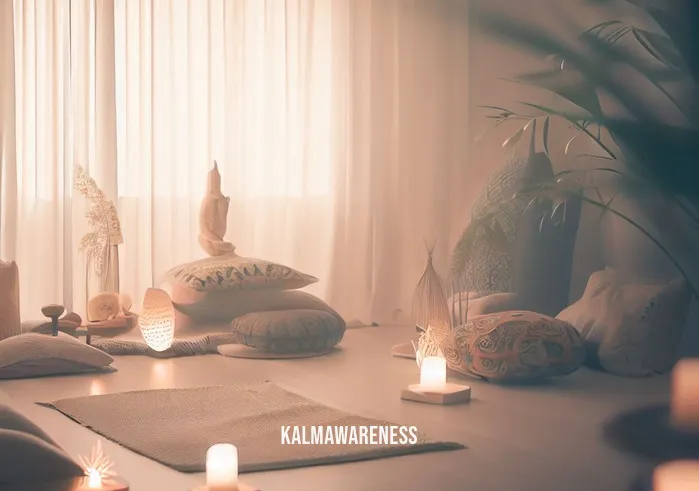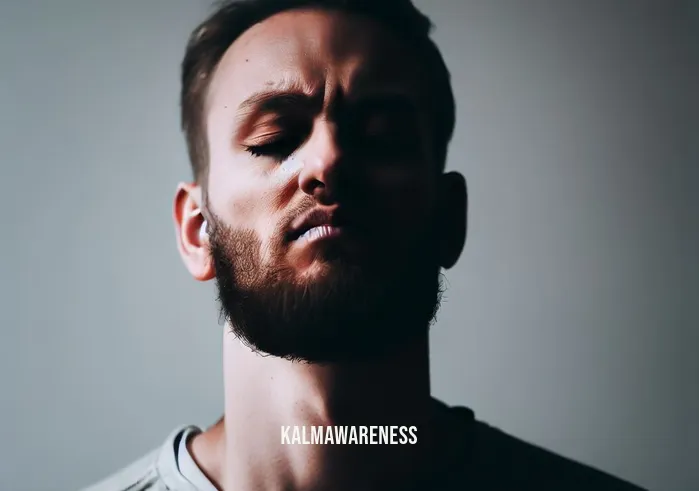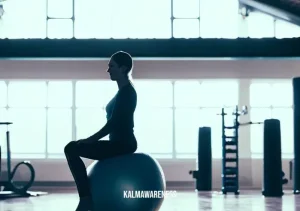Can You Lay Down and Meditate? Exploring the Comfort and Benefits of Reclining Mindfulness Practices
The Traditional Image of Meditation and Why It’s Changing
When the concept of meditation comes up, most people’s minds conjure up an image of an individual sitting cross-legged on the floor, eyes closed, palms resting on the knees, perhaps even uttering an “Om” or two. While this is a classic posture for many types of meditation, it’s essential to recognize that the meditation world is rapidly evolving. New meditation methods are being introduced, backed by research and practical application, that challenge our traditional ideas about what meditation should look like. Among these modern approaches is the practice of lying down to meditate.
Unpacking the Question: Can You Lay Down and Meditate?
The idea of reclining or lying down while meditating raises a question: can you lay down and meditate effectively? To address this query, we need to consider various aspects of relaxation, mindfulness, and posture. Traditional sitting meditation has its merits, particularly in the realms of mindfulness and focus. However, lying down offers a unique set of benefits, especially concerning relaxation and rest. In fact, mindful movement practices that include lying down are becoming more popular due to their emphasis on bodily awareness and comfort.
Why Consider Lying Down for Meditation?
Physical Comfort: For some people, sitting for extended periods can be physically challenging due to back pain or other discomforts. Lying down can provide a more relaxed state that eases the body, allowing for a more extended and focused meditation session.
Ease into Sleep: Those who struggle with insomnia or sleep disorders may find a reclining position beneficial. It’s a part of sustainable self-care that promotes relaxation and eases the transition into sleep, especially when combined with techniques like mindful hypnobirthing or EMDR meditation.
Deepened Body Awareness: Being in a reclining position may actually heighten your sense of touch and physical awareness. Techniques that encourage you to touch that body part during meditation can be performed more naturally in a lying down posture.
“The position of our body can significantly influence our mental state. Being comfortable in your posture is not just a matter of preference; it’s a way to deepen your meditation experience.”
The Caveats and Tips for Lying Down Meditation
While lying down to meditate has its advantages, it’s not without its caveats. There’s a potential for dozing off, especially if you’re already feeling tired. For those who are new to this practice, meditation made simple techniques can help in staying focused even when lying down. The idea is not to fall into a 15-minute power nap, although that has its own benefits, but to remain engaged in a state of mindful relaxation.
Therefore, before settling into a lying down meditation session, it might be beneficial to engage in a brief activity that promotes wakefulness, such as a quick walk (even teenagers are walking to promote mindfulness) or a series of light stretches inspired by Rouse Yoga.
Moving Forward: The Intersection of Rest and Mindfulness
Meditation, at its core, involves attaining a peaceful state of mind in which thoughts are not occupied by worry. Whether you choose to sit, stand, walk, or lie down, the end goal remains the same: achieving a state of mindful awareness. Understanding the nuances of these various postures and methods is part of the larger journey towards mindfulness.
The key takeaway here is flexibility—being open to different styles and postures in meditation can enrich your practice and make it more accommodating to your lifestyle and needs. This flexibility in approach aligns well with a broader view of mindfulness as not just a practice but a way of living that one can incorporate into each blessed day.
Feeling intrigued about the practical aspects and techniques that lying down meditation offers? Continue reading to delve deeper into how lying down can be an element of some advanced meditation exercises and what experts think about its efficacy.

Exploring Techniques: How to Effectively Meditate While Lying Down
The Versatility of Meditation Positions
Meditation is a practice that’s been adapted in myriad ways to fit diverse lifestyles and physical needs. We already explored the broad idea of whether you can lay down and meditate, but let’s focus now on the nitty-gritty—how can you do it effectively? What techniques and tips can optimize your lying down meditation experience?
Techniques that Complement Lying Down Meditation
Incorporating specific meditation techniques can elevate your reclining meditation sessions. Here are some methodologies that synergize exceptionally well with this posture:
Guided Meditation: Engaging with a well-crafted guided session can be particularly beneficial when lying down, as it can help maintain focus and fend off the temptation to sleep.
Progressive Muscle Relaxation: Lying down is an excellent position to practice tensing and relaxing muscle groups, thereby promoting a profound sense of physical relief.
Sound Therapy: Utilizing specific sound frequencies like 256 Hz can heighten your meditation experience, allowing you to tune into the vibration of the sound rather than the thoughts racing through your mind.
Visualization: The reclined posture is conducive to entering a vivid imaginative state, making techniques like judgment of the wise much easier to integrate into your meditation.
Note: When exploring these techniques, it’s crucial to keep in mind that while the lying down position offers unique advantages, the core objective is to attain mindfulness.
Table: Pros and Cons of Lying Down Meditation Techniques
| Technique | Advantages | Disadvantages |
|---|---|---|
| Guided Meditation | Keeps you focused, varied topics | Requires an audio device, can become dependent |
| Progressive Muscle Relaxation | Effective for physical relaxation, easy to perform | May induce sleep if overly relaxed |
| Sound Therapy with 256 Hz | Elevates emotional state, enhances concentration | Specialized equipment may be required |
| Visualization | Promotes creativity, supports emotional processing | Requires substantial mental effort |
The Fast Track to Deep Meditation: How Lying Down Helps
When people explore how to go deep into meditation quickly, often the suggestions include complex breathing techniques and strict postural requirements. However, the comfort level while lying down can actually be a fast track to deeper states of meditation. You might be wondering, how do we get deep so fast when lying down? The answer is simple: comfort enables relaxation, and relaxation is the bedrock upon which deeper states of mindfulness can be achieved.
Variations for Different Lifestyle Needs
It’s also important to note that lying down meditation isn’t a one-size-fits-all solution. For example, teenagers or young adults who have a robust physical routine may find the element of some meditation exercises while lying down to be particularly beneficial post-workout. On the other hand, someone looking to stabilize their emotions may find that lying down allows them to let go of physical tension more quickly, thereby focusing on their emotional well-being.
“To say that one position is universally superior for meditation would be an oversimplification. Like any aspect of mindfulness, the ‘best’ approach is the one that works for you.”
What Awaits You in the Journey Ahead
Understanding the techniques and benefits of lying down meditation is only the beginning. There’s an entire world of mindfulness practices that align with varying lifestyle needs, which we will explore further. Curious to know how lying down meditation compares with other unconventional meditation methods? Want to understand its broader application in routines that include walking or even power napping?
Continue reading to uncover more about the versatility of lying down meditation and how it integrates into an expansive view of daily mindfulness practices.

Nurturing the Spirit: The Inspirational Power of Lying Down to Meditate
The Transformative Potential of Lying Down Meditation
Meditation is not merely a practice but a journey—one that can inspire profound transformation both mentally and physically. As we’ve delved into the how-to of meditating while lying down, it’s worth noting how this approach can provide more than just relaxation; it can offer a source of inspiration and hope.
“Hope is being able to see that there is light despite all of the darkness.” – Desmond Tutu
In the quest for mindfulness, it’s essential to recognize the accessibility of laying down as a posture for meditation. There’s a notion of inclusivity here that allows people from all walks of life, including those who are bedridden or living with chronic pain, to access mindfulness. The question is no longer just, can you lay down and meditate? but also, how can lying down to meditate be a source of hope and empowerment?
Making Space for Reflection: A Path to Mindfulness and Inner Calm
Lying down to meditate carves out a sacred space where you can put aside the burdens of daily life and reflect on your inner world. With the use of techniques that involve attaining a peaceful state of mind, you grant yourself the permission to focus on what genuinely matters.
“Reflection is the lamp of the heart. If it departs, the heart will have no light.” – Imam Al-Haddad
Lying Down Meditation as an Emotional Sanctuary
Consider the reclining posture of meditation not just as a physical position but as a safe emotional space. Being comfortable enables you to confront emotions and thoughts that you may not otherwise engage with. Emotional Freedom Techniques like EMDR meditation can be incredibly powerful in this setting, offering a gentle way to process trauma or emotional distress.
“The wound is the place where the Light enters you.” – Rumi
The Ripple Effect: How Meditating While Lying Down Impacts the Rest of Your Life
Finding inspiration through lying down meditation has a ripple effect that extends to various aspects of your life. For example, introducing sustainable self-care habits becomes easier when your mind is free from the constant hum of stress. The calmness achieved in a reclining meditation session can serve as a catalyst for more harmonious interpersonal relationships, better decision-making, and a generally optimistic outlook on life.
Affirmation-Based Meditations for Uplifting the Spirit
Incorporating affirmations into your lying down meditation can lead to a feeling of upliftment, setting a positive tone for the rest of the day. Jack Kornfield’s Meditation for Beginners provides an excellent starting point for those new to affirmation-based meditation.
“Affirmations are our mental vitamins, providing the supplementary positive thoughts we need to balance the barrage of negative events and thoughts we experience daily.” – Tia Walker
What Awaits in Your Future Mindfulness Journey
We have explored the technical aspects and even dug into the inspirational depths that lying down meditation can offer. But this journey is far from over. If you are curious to know how lying down to meditate can intertwine with other restorative practices like yoga, or how it fits into the science-backed wellness routines, you won’t want to miss what’s coming next.
Embark on the next chapter to discover how lying down meditation fits seamlessly into a holistic approach to wellness and mindfulness. Uncover how this simple yet powerful practice is more than just another tick on your wellness checklist—it is an avenue for complete self-transformation. Continue reading and allow the transformative power of lying down to meditate to lead you to new horizons.

The Intricacies of Serenity: Unpacking the Details of Lying Down to Meditate
The Spectrum of Lying Down Meditation: It’s More than Just Relaxation
As we venture deeper into the realm of mindfulness, it’s critical to unravel the nuanced benefits and methods associated with meditating in a lying-down posture. While you’ve seen that lying down to meditate can offer relaxation, empowerment, and inspiration, it’s time to dissect the specifics. So, can you lay down and meditate? Absolutely, and here’s what you need to know in detail.
Unlocking the Synergy of Mind and Body
Meditating in a reclining position isn’t merely an alternative to sitting; it has its unique set of physiological and psychological benefits.
Ease for the Spine: Lying down allows your spine to maintain its natural curve, especially beneficial for those with back issues.
Enhanced Blood Flow: When you’re horizontal, your heart doesn’t work as hard to pump blood, facilitating better circulation.
Focused Breathing: This posture can be particularly beneficial when practicing breathing exercises. Mindful hypnobirthing is one such breathing-centered technique often practiced while lying down.
Reduced Muscle Tension: Lying down provides an even distribution of your body weight, which can lessen muscle tension. This setting is perfect for techniques like Rouse Yoga that focus on relaxing the body.
Grounding and Alignment: When your entire back is in contact with the floor, it’s easier to be aware of your body’s alignment. For individuals new to meditation, lying down can make it easier to enter a state of mindfulness as demonstrated in Meditation Made Simple.
Frequencies and Soundscapes in Lying Down Meditation
You might wonder if sound can play a role when you’re lying down to meditate. Indeed, sound can be an element of some meditation exercises. Lying down may even enhance your auditory experience. Here’s how:
Sound Bath Meditation: Imagine being surrounded by sounds that resonate with specific frequencies like 256 Hz, known for their calming effects.
Binaural Beats: Using headphones, you can immerse yourself in binaural beats designed to synchronize brainwave patterns.
Guided Meditations: Audio-guided meditation sessions can lead you through visualization exercises that are especially impactful in a lying-down posture.
Transitioning From Wakefulness to Restful States
How does lying down to meditate influence the transition from wakefulness to other states like sleep or deeper meditation? You’ll find this method can be an effective bridge, particularly when paired with activities like a 15-minute power nap, helping you tap into rejuvenation even in brief periods.
What Awaits You: The Final Chapter
We’ve dissected the multifaceted aspects of meditating while lying down, from physiological perks to its synergistic impact when combined with soundscapes and transitional states. If you thought this information was enlightening, the final chapter will offer you an integrative understanding of how lying down to meditate is more than a simple relaxation technique.
In the next chapter, we will pull together everything we’ve learned to present you with an integrated picture of lying-down meditation. We’ll look at its place in a broader wellness lifestyle and offer you actionable takeaways for immediate implementation. Are you ready to delve into the transformative power that lying down to meditate can offer? Keep reading and prepare for a comprehensive wrap-up that aims to inspire your journey into mindfulness.

Reclining Into Mindfulness: Final Reflections on the Journey of Lying Down to Meditate
A Mindful Journey: From Skepticism to Embrace
Here we are, at the end of this enlightening voyage through the varied landscape of lying down and meditating. Whether you began as a skeptic questioning, “Can you lay down and meditate?” or were already attuned to its merits, this journey has shed light on its multifaceted beauty and potential.
When Rest Becomes Revolutionary
Lying down to meditate is more than just an act of rest; it’s a transformative approach to mindfulness that touches on various spheres of well-being. From embracing sustainable self-care to using the judgment of the wise to discern its role in your daily routine, lying-down meditation becomes an indispensable part of your holistic health regimen. Plus, it’s an excellent technique to involve attaining a peaceful state of mind in which thoughts are not occupied by worry.
Your Daily Dose of Horizontal Mindfulness
Isn’t it amazing to consider that something as seemingly simple as lying down can be pivotal in your self-care and mental wellness journey? The power of this horizontal meditation extends beyond adults. Even teenagers walking the tightrope of adolescent pressures can find solace through this method. As you keep in mind its expansive utility, remember that each day holds the promise of mindful moments, one for each blessed day.
A Toast to Your Mindful Reclining
As we close this chapter on lying down to meditate, here’s a toast to you for taking this step towards a calmer, more focused, and holistically healthier version of yourself.
Your Next Steps
If you’re looking for more mindfulness tips and relaxation techniques, don’t hesitate to revisit previous sections of this magazine for a refresher. Whether it’s your first time meditating or you’re exploring new methods, there’s something here for everyone.
A Heartfelt Thank You
Thank you for taking this enlightening journey with us. The curiosity and openness you’ve demonstrated by diving deep into the question, “Can you lay down and meditate?” are testament to your willingness to evolve and grow. Rest assured, there’s plenty more insightful content coming your way in future editions.
Here’s to Your Horizontal Harmony!
So, get your yoga mat or even just a comfortable piece of floor, lie down, and revolutionize the way you meditate. As you continue to explore this refreshing avenue of mindfulness, may you find peace, happiness, and a sense of accomplishment in knowing you’re doing something profoundly good for yourself.
Stay tuned for more journeys into the world of well-being and mindfulness. In the meantime, why not lie down and meditate? After all, as we’ve seen, it’s an invitation to a transformative experience. Happy meditating!





